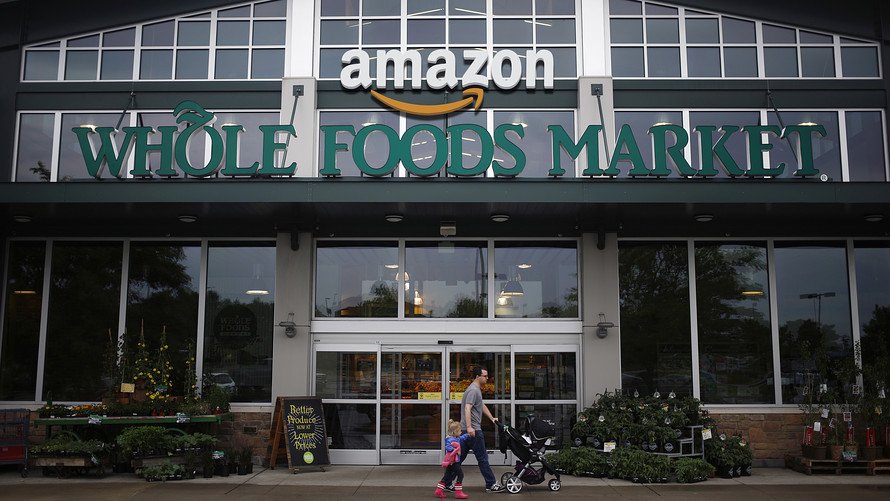Wednesday, 18 February 2026
The opposite way?
Online retail giant Amazon.com’s announcement to acquire another big enterprise in traditional brick & mortar business, retail grocery store chain Whole foods Inc. is like moving in the opposite direction…

Online retail giant Amazon.com’s announcement to acquire another big enterprise in traditional brick & mortar business, retail grocery store chain Whole foods Inc. is like moving in the opposite direction – e-commerce enterprise also turning to traditional retail business.
Online retail giant Amazon.com’s announcement to acquire another big enterprise in traditional brick & mortar business, retail grocery store chain Whole foods Inc. is like moving in the opposite direction – e-commerce enterprise also turning to traditional retail business. Some may find this opposite journey a strange one as the world is fast moving towards online buying of various types of commodities.
About eight months back a brick & mortar giant Walmart stores inc. acquired one of the fastest growing e-commerce company jet.com. The deal was inked “to offer the simplest, easiest shopping experience the Walmart customer want” and faster e-commerce growth of Walmart in future. A traditional retail store chain acquiring e-commerce company was considered natural when the world is moving to online purchase.
The announcement is really strange in one more way. Just two years back John Mackey, CEO, Whole Foods inc., had said that Amazon’s move into grocery delivery would be its Waterloo. But obliviously Amazon must be having some market compulsions and it also must be seeing good business potential in this other way journey. Amazon has already entered into grocery business by brand name Amazon Fresh.
Though Amazon Whole foods deal has been announced industry experts feel that it may not come through as the latter may get more offers. In 13.7 billion USD deal, Amazon has agreed to buy Whole Food’s each share for $ 42. The stocks moved upward to over $ 43 per share the day after the deal was announced. Industry experts interpret it as the real price of the Whole food from shareholders’ perspective is higher and hence it will receive more offers with higher price. However, these are only expectations of industry experts, which may turn into reality or not. The current fact is that Amazon and Whole food have announced their agreement.
So, it can be very well assumed that the announced deal will pass through all the legal and technical barriers. Thus, the question is why an online e-commerce giant felt like buying a chain of stores when just few months back another chain of stores did exactly opposite by buying over an online store. The simplest answer to the question is as a traditional retailer wants to enter the online market to compete an online giant, the online giant wishes to establish its presence in the brick & mortar market to compete the traditional giant.
In its recent study done for Blue Aprons Public Filing, Euromonitor predicts that the online will grow 15 times faster than the rest of the restaurant business by 2020. According to a recent report from Nielsen and Food marketing Institute about 25% households currently do grocery shopping online, a rise of 5% in just three years. They expect over 70% household to shop groceries online in next decade, during which period the actual grocery market will grow five time more reaching $ 100 billion.
Still, Amazon wants to be in brick & mortar business probably because people’s preference while buying all types of foods is to personally watch, check and handle the commodities before making a purchase decision. Consumers generally do not like to select food items, groceries, fruits & vegetables only by seeing their pictures & knowing prices and then just to receive packets of those food items delivered to home. Every piece of fruit or vegetable is different than the other, every piece has different level of freshness, the immense varieties in grocery items with very little variations, but which count a lot.
Probably, realising these factors Amazon wants to enter into brick & mortar business despite market consultancy reports informing that customers are turning to online buying on large scale. It wants to build synergies in strengths of the two companies. Amazon has expertise in inventory management, supply chain and warehousing while Whole Foods is good sourcing high quality organic product, which is customers’ preference. By acquiring Whole foods entering it want to have a balance between online stores and actual stores.
Amazon’s decision shows two realities. The traditional process of grocery buying is not going to die soon. Amazon sees opportunity there and finds its online food business incomplete at least for some years onwards. Secondly, if an entity wishes to build its business in people’s daily needs like groceries and foods etc. it has to have a presence online as well as in the physical shopping. Old meeting the new is a reality to grow the business.
Some experts look at this deal from altogether a different angle. Dennis Berman, Finance Editor, Wall Street Journal, has pointed out that Amazon has acquired through this deal over 400 prime locations in upper income areas. The physical presence in the traditional retail market through these 400 plus locations will help Amazon to use them as its distribution nodes. These eventually could be used for its other products also. That will reduce Amazon’s delivery time.
One of the major effects of the proposed deal will be on other small chains of grocery stores or individual grocery stores in traditional retail business. In resonance with its current style of business operations Amazon is expected to work on lower profit margins. This would surely be a problem for other smaller chains and independent stores as Amazon would not care for the price and lower its prices. To compete the others to will have to reduce their prices and that will be very difficult for small players.
It will also be worth watching that what kind of new technologies or ideas Amazon introduces in the field of combination of online and offline grocery sale. Whatever other effects of the announced deal may be but one thing is for sure that it will bring online and offline grocery sales nearer, diluting the demarcation line between them. May be the future players in the sectors will have to be successful in both ways to retain their market dominance. Amazon has realised that and hence it seems to have started moving the opposite way also.
Technology
Carlsberg Launches AI-Crafted Lunar New Year Packaging
Feb 17, 2026 | Beverages
FAO Experts Assess Risk of Antimicrobial Resistance Spreading via Food Loss and Waste
Feb 17, 2026 | Sustainability
Food Testing
Redefining Trust in Organic Foods through Independent Testing
Feb 13, 2026 | Food Safety and Testing
AFNOR International Eyes Global Food Safety Growth with HACCP Group Takeover
Feb 04, 2026 | Australia
More Popular
Hormel Foods Announces Agreement to Sell Whole-Bird Turkey Business to Life-Science Innovations
Feb 18, 2026 | Company News
Kodiak Expands Frozen Lineup with No Sugar Added Homestyle Power Waffles
Feb 18, 2026 | Company News






